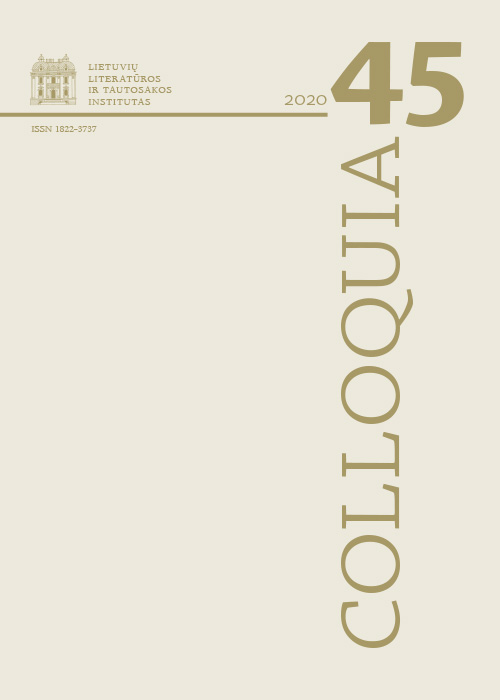Apie Henriko Nagio niveau
Santrauka
Straipsnyje žvalgomos lietuvių išeivijos poeto Henriko Nagio kūrybos, pripažinimo ir išlikimo įtakingu literatūros lauko veikėju trajektorijos. Jos analizuojamos pasitelkus duomenis iš archyvinės epistolikos, dienoraščių, memuarų ir kultūrinės spaudos. Tyrimui pasirinktas istorinis empirinis metodas, tinkamiausias stebėti kitusią estetinių ir moralinių Nagio pasirinkimų bei jo vertinimų dinamiką lietuvių išeivijos literatūrinio gyvenimo kontekste – kūrybos pripažinimą, Nagio vykdytą jo kartos pozicijų stiprinimą, artimos estetinės linijos autorių iškėlimą į pirmaujančių gretas (t. y. hierarchizavimo veiksmus), o vėliau ir skausmingą reagavimą į juntamą savo asmens ir kūrybos išstūmimą iš hierarchijos viršūnės. Greta legitimuojančių kritikų nuomonių Nagio recepcijos tyrimų akiratyje šios epitekstinės charakteristikos yra svarbios reflektuojant nevienaplanį kūrėjo profilį, atskleidžiamą gilinantis į jo laikyseną, principus ir pažiūras, oponavimo ir bekompromisio priešinimosi praktikas.
Atsisiuntimai
Skaitomiausi šio autoriaus(ų) straipsniai
- Gintarė Bernotienė, Poeto mirtis. Epitafijos ir dedikacijos Vytautui Mačerniui , Colloquia: T 49 (2022)
- Gintarė Bernotienė, Dalis Dalios , Colloquia: T 51 (2023): Colloquia
- Gintarė Bernotienė, Karolina Bagdonė, Gitana Vanagaitė, Doktorantūra Lietuvoje - ,,be lūkesčių, gairių ir studijų politikos'' , Colloquia: T 47 (2021)
- Gintarė Bernotienė, Gitana Vanagaitė, Apie literatūros ir gyvenimo būsenas. Pokalbis su Jūrate Sprindyte , Colloquia: T 50 (2022): Colloquia
- Gintarė Bernotienė, Atminties sugrįžimas: architektūra ir kraštovaizdis Winfriedo Georgo Sebaldo romane Austerlicas ir autobiografiniuose lietuvių tremtinių pasakojimuose , Colloquia: T 52 (2023): Colloquia
- Gintarė Bernotienė, Renaldas Gudauskas, Vytautas Landsbergis, Rasa Juknevičienė, Andrius Kubilius, Emanuelis Zingeris, Donata Mitaitė, Vytautas Ališauskas, Laurynas Peluritis, „Ar aš galiu dar suspėti ką nors padaryti?“: Vytautas Kubilius ir intelektinis bei kritinis mąstymas kuriant valstybę , Colloquia: T 52 (2023): Colloquia
- Gintarė Bernotienė, Pratarmė , Colloquia: T 54 (2024): Colloquia
- Jūratė Sprindytė, Gintarė Bernotienė, Pratarmė , Colloquia: T 39 (2017)
- Jūratė Sprindytė, Gintarė Bernotienė, Pratarmė , Colloquia: T 40 (2018)
- Gintarė Bernotienė, Vertimų politikos svertai formuojant kanoną. Juditos Vaičiūnaitės patirtis , Colloquia: T 36 (2016)
